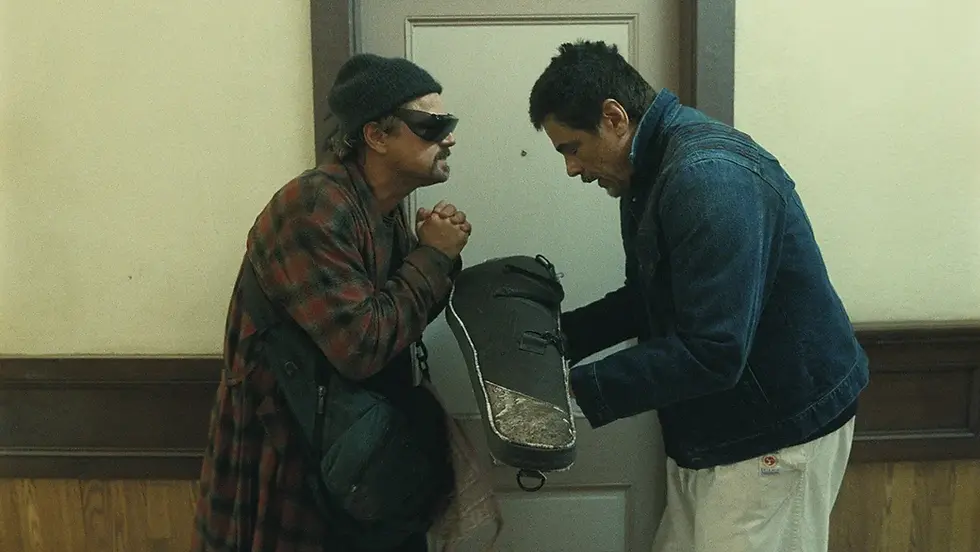One Master After Another: The Prophets Of Paul Thomas Anderson
- R.A. Noble

- Nov 9, 2025
- 6 min read

“In choosing your god, you choose your way of looking at the universe. There are plenty of Gods. Choose yours.”
– Joseph Campbell, A Joseph Campbell Companion: Reflections on the Art of Living
How do we choose our god?
I think about this question when I accompany my mother, a devout Catholic, to Mass. I am not a pious person. But whenever I’m in the Philippines, I stand in the congregation with her, understanding that the vehicle that has guided her choice is her priest. Her Prophet.
In mythology, Joseph Campbell provides a framework for the Prophet archetype and how it fits into the Hero’s Journey. The Prophet is often a charismatic leader who speaks with divine authority. They are resolute in their conviction, bucking societal norms and, in turn, facing opposition to their proffered gospel. The Prophet asks for trust, loyalty, and eventually, absolute devotion from their followers and subsequently the Hero. When the Hero enters their orbit, they must either refuse or accept the Prophet’s Call to Adventure.
A number of Paul Thomas Anderson’s films, particularly The Master (2012) and his most recent outing, One Battle After Another (2025), exemplify modern adaptations of this framework. The Heroes of each story encounter a Prophet. And it’s up to each Hero to decide whether to follow this Prophet, and ultimately, choose their god.
The Prophet asks for trust, loyalty, and eventually, absolute devotion from their followers and subsequently the Hero.
The Master and the false prophet
“Go to that landless latitude, and good luck. For if you figure a way to live without serving a master, any master, then let the rest of us know, will you? For you'd be the first person in the history of the world."
– Lancaster Dodd, The Master
In The Master, Lancaster Dodd (Philip Seymour Hoffman), personifies the quintessential Prophet. He is the resolute leader of the Cause, a group that offers a path to perfection—a system meant to relieve humanity of its traumas and modern vices through connecting with past lives.
Our Hero, Freddie Quell (Joaquin Phoenix), is a wandering alcoholic battling the trauma of lost love amidst the aftermath of World War II. During his fumbling journey, Quell stumbles, literally, upon his Prophet. After a night of heavy drinking, he wakes up on a boat where he meets Dodd:
“This your ship?” Quell asks through bloodshot eyes.
“I’m its commander, yes,” Dodd replies.
“Where’s it goin?”
Our Hero’s curiosity reflects his willingness to consider the Prophet’s Call to Adventure. He joins Dodd’s legion, perhaps out of need, but whether he truly embraces Dodd’s teachings is unclear. He oftentimes seems reluctant or confused.
Quell does, however, unequivocally accept Dodd. Dodd provides Quell with purpose and direction. And even when he doesn’t understand the Cause or its teachings, Quell defends Dodd against every challenger—he provides beatdowns of an outside naysayer and a fellow Cause member who criticizes Dodd’s work.
In the context of the Hero’s journey, though, Dodd fails to convince Quell that his path and his god can save him. Quell reverts back to his directionless life. This failure suggests that the Prophet’s role, at least here, is not to lead the Hero to the Prophet’s god, but to enable the Hero to choose his own path and his own god.
One battle after another’s true prophet
“No fear. Just like Tom fuckin' Cruise.”
– Sergio St. Carlo, One Battle After Another
“Sensei!”
Our Hero in One Battle After Another immediately embraces his Prophet, showing reverence via the continual uttering of the Sensei moniker. A burnt out revolutionary, Bob Ferguson (Leonard DiCaprio) finds himself on a frantic search to save his daughter from the sins of his past. He is as equally lost as the Master’s Freddie Quell and finds solace in Sergio St. Carlo (Benicio Del Toro), his daughter’s martial arts instructor.
St. Carlo hits the qualities of the Prophet in similar ways to Lancaster Dodd in The Master – he is the de facto leader of a community. He is eccentric, wise, and stalwart in his demeanor. He leads a community that protects undocumented immigrants. His god is the belief in maintaining his people’s humanity in the face of a violent challenger, his own government. His god is protection, and he applies this philosophy to help Bob provide the same blanket to his daughter.
Ferguson’s acceptance of Sergio as his Prophet, the handing over of his fate to the Sensei’s philosophy of courage and fearlessness, proves vital to the success of his journey. Like the Mentor/Teacher archetype, Bob and Sergio eventually split, with Bob equipped with the fortitude (and shotgun) he needs to save his daughter.
Where St. Carlo succeeds and where Dodd fails is St. Carlo’s willingness to allow his Hero the opportunity to continue towards his own path. Dodd believes his way is the only way. When St. Carlo and Ferguson split, St. Carlo informs him that Ferguson is now going to be on his own—Ferguson balks, and St. Carlo physically has to throw Bob out of his car.
One Battle After Another’s Prophet, then, succeeds in signifying what a true Prophet can do for its Hero: facilitate him on his journey, provide him with the groundwork he needs, and to allow him the space to follow his own path, on his journey to god. For Bob, god is the rescuing of his daughter, and with St. Carlo’s help, he sees this through to the film’s spectacular end.
All roads lead to your own
“You can't ask somebody to give The Reason, but you can find one for yourself; you decide what the meaning of your life is to be.”
For Campbell, The Prophet is merely a guide. Through his work and words, he suggests that this guide leads you only to where you need to be on your journey.
In The Master, Dodd as Prophet leads his Hero to a new beginning. Although Dodd’s philosophy did not save Quell, it did bring him to the true beginning of his adventure. Only upon Quell’s rejection of Dodd as Prophet does he finally embark on his journey, his path. Perhaps his god remains unknown, but his Call to Adventure is firmly answered.
By contrast, In One Battle After Another, St. Carlo leads Bob to his path but then lets go. The Hero answers the Call to Adventure without hesitation, and his Prophet takes him only so far as is necessary to let him choose where to go next.
Regardless of a Hero’s rejection or acceptance of their teachings, the Prophet ultimately leads his Hero to a critical juncture. The rest of their journey, how they choose their path or their god, is up to them.
MythBlast authored by:

R.A. Noble is a writer and attorney based in Brooklyn, New York. He is the author of the chapbook Asymptotes: On Closeness and the short story Post-Colonial Poop. His forthcoming novella Barbarians of Batangas will be published in November 2025 by Bad Words Press. His first short play co-written with the artist Kyle Wilhite entitled This Is How You Fall in Love, will debut November 2025 at Under St. Marks Theater in New York.
This MythBlast was inspired by Myth & Meaning and the archetype of The Prophet.
Latest Podcast
In this episode, we present audio from two rare televised lectures from Joseph Campbell’s early public-broadcast career — Dead Sea Scrolls and No God but God — originally aired on WNDT in New York in the early 1960s. In these archival recordings, Campbell traces humanity’s spiritual crossroads — from Paleolithic caves and Near Eastern temples to the Essene community at Qumran and the dawn of apocalyptic thought. He examines the Dead Sea Scrolls as the voice of a community bracing for the end of days, and explores how Greek philosophy, Persian dualism, Hebrew prophecy, and emerging Christian teachings collided and transformed one another. Broadcast decades before The Power of Myth, these talks capture Campbell in a more structured, scholarly television mode — yet still pulsing with the fire of myth, history, and spiritual imagination. A window into the mythic ferment before the birth of Western religious consciousness — and a glimpse of Campbell before he became a household name. Host Bradley Olson offers an introduction and commentary at the end of the lecture.
This Week's Highlights
"You really can't follow a guru. You can't ask somebody to give The Reason, but you can find one for yourself; you decide what the meaning of your life is to be."
-- Joseph Campbell

%20BB.png)











